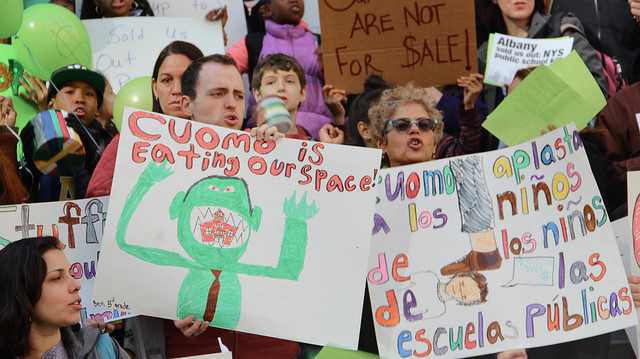
A top official in the New York State Comptroller’s Office has urged regulators to require more transparency on charter-school finances. The response has been, well, nonexistent.
Add another voice to those warning about the lack of financial oversight for charter schools. One of New York state’s top fiscal monitors told ProPublica that audits by his office have found “practices that are questionable at best, illegal at worst” at some charter schools.
Pete Grannis, New York State’s First Deputy Comptroller, contacted ProPublica after reading our story last week about how some charter schools have turned over nearly all their public funds and significant control to private, often for-profit firms that handle their day-to-day operations. The arrangements can limit the ability of auditors and charter-school regulators to follow how public money is spent – especially when the firms refuse to divulge financial details when asked.
Such setups are a real problem, Grannis said. And the way he sees it, there’s a very simple solution. As a condition for agreeing to approve a new charter school or renew an existing one, charter regulators could require schools and their management companies to agree to provide any and all financial records related to the school.
“Clearly, the need for fiscal oversight of charter schools has intensified,” he wrote in a letter to New York City Mayor Bill de Blasio last week. “Put schools on notice that relevant financial records cannot be shielded from oversight bodies of state and local governmental entities.”
It’s a plea that Grannis has made before. Last year, he sent a similar letter to the state’s major charter-school regulators – New York City’s Department of Education, the New York State Education Department, and the State University of New York.
He never heard back from any of them. “No response whatsoever,” Grannis said. Not even, he added, a “‘Thank you for your letter, we’ll look into it.’ That would have been the normal bureaucratic response.”
We contacted all three of these agencies and the mayor’s office for comment. None of them got back to us.
The charter-school debate in New York, as elsewhere, is politically fraught. De Blasio’s cautious stance on charters has put him at odds with New York Gov. Andrew Cuomo, whose financial backers include some big-dollar charter-school supporters. The state comptroller’s office has faced repeated lawsuits from charter groups and operators challenging its authority to audit charter schools.
To Grannis, though, his efforts aren’t about politics. His office is “agnostic on charters,” as he put it. His office also audits the finances of traditional public-school districts, he pointed out.
“We’re the fiscal monitors. We watch over the use or misuse of public funds,” Grannis said. “This isn’t meant to be anti-charter. Our job is not to be pro or anti.”
Grannis has not yet gotten a response from the mayor’s office about the letter he sent last week.
As to the charter-school regulators who got his letter the year before? He’s still puzzled why they wouldn’t be more interested in a possible fix, or why the charter regulators never bothered to respond.
“I honestly don’t know,” Grannis said. He said he’s going to send another round of letters to them.
Press freedom is under attack
As Trump cracks down on political speech, independent media is increasingly necessary.
Truthout produces reporting you won’t see in the mainstream: journalism from the frontlines of global conflict, interviews with grassroots movement leaders, high-quality legal analysis and more.
Our work is possible thanks to reader support. Help Truthout catalyze change and social justice — make a tax-deductible monthly or one-time donation today.